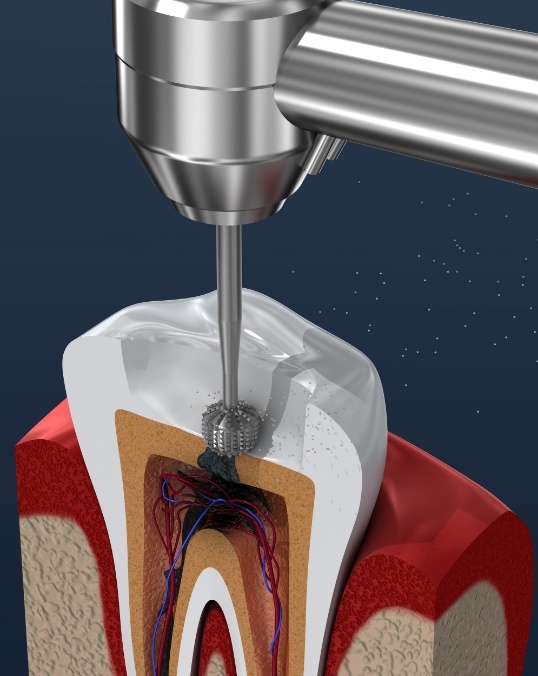Root Canal Treatment – Saint Peters, MO
Cure Toothaches Caused by Infections

Not all toothaches are created equal. Some are just annoying—like when you have a piece of food stuck between two teeth. That’s when you probably need to floss to get rid of the discomfort. However, when a toothache is so bad that you can’t think of anything else or you can’t sleep at night, then you may have an infected tooth. For this, there is root canal treatment. Read on to learn more about how tooth infection develops and how root canal treatment can save the tooth and your smile.
Why Choose Klassik Smiles for Root Canal Treatment?
- Cutting-Edge Diagnostic Dental Technology
- We Accept & Maximize Dental Insurance
- Dentist with 25+ Years of Experience
Why Are Root Canals Necessary?

An X-ray will show Dr. Makwana for certain whether or not you need a root canal. However, if you’re experiencing a terrible toothache, then chances are you really do need one.
What’s causing the pain? As with a lot of bodily aches and pain, the culprit is inflammation. The infection grows and takes up more space inside the confines of your tooth, and the resulting inflammation sets off the tooth’s nerve. Ouch!
Other signs of an infected tooth include:
- Sensitivity to hot and cold temperatures
- Pain when you bite or chew
- A sore on the gum tissue near the infected tooth
- Swelling near the sore side of your face
- Fever
In rare cases, an infected tooth does not show any signs or symptoms. That’s why biannual dental exams are important. Dr. Makwana can see the infection on an X-ray even if you’re not having any other symptoms.
What Happens During Root Canal Treatment?

First, let’s be clear—a root canal is not painful. Unfortunately, they have that reputation. But in fact, a root canal is the procedure that eliminates the pain of an infected tooth.
Dr. Makwana first anesthetizes the tooth and surrounding tissue.
Then, special hand files are inserted through a small hole to remove the infection from inside your tooth. The space is disinfected and filled with a biocompatible material that expands to support the remaining tooth structure. Finally, the tooth is tightly sealed to prevent recontamination and prepared to receive a dental crown. Once the crown is in place, you have a restored tooth that looks and performs just like one of your natural teeth.
Understanding the Cost of Root Canals

While many patients worry about how a root canal will feel, others are concerned with the potential cost. Because the treatment is different for each patient, the price can fluctuate. There are a few determining factors that will go into what you ultimately pay, and understanding what they are should give you a better idea of what to expect. Thankfully, we accept multiple payment options so patients don’t have to stress about this treatment.
Factors That Can Affect Root Canal Cost
- Location of the Tooth: The back teeth are larger and have more root canals where infection can spread, so the procedure will cost more compared to getting it for a front tooth.
- Type of Dental Crown: Most root canal treated teeth need to be topped with a crown afterward, and the cost can vary depending on the material used (porcelain is more than traditional metal).
Is it Cheaper to Pull My Tooth?
While getting an extraction might seem more straightforward and affordable than undergoing a root canal, the opposite is actually true.
Side by side, a root canal and crown cost significantly less compared to having a tooth removed and restored. Many patients propose simply not replacing the tooth, but this greatly elevates their risk of developing gum disease and tooth loss (which will require more expense to fix). Both in the short and long term, a root canal is the more conservative financial choice.
Does Dental Insurance Cover Root Canal Treatment?
Yes, the vast majority of dental insurance plans can be used to help pay for root canal treatment. How much depends entirely on the specifics of your policy and whether or not you’ve met your deductible or yearly maximum. On average, insurance benefits tend to cover about 50-80% of the procedure.
Other Options for Making Root Canal Treatment Affordable
If a patient does not have insurance, we offer two other ways to make paying for a root canal relatively easy. Firstly, they can sign up for low-to-no-interest financing with CareCredit by clicking here. Or, they can join our in-house membership plan, which covers cleanings, checkups, and more for the entire year and offers a 10% discount on all other treatments after paying one flat fee that is much less than insurance premiums. We’ll talk about all of this at your initial appointment so you have a plan in place before we perform your treatment.
Benefits of Getting a Root Canal

- Immediate Solution: Root canal treatment quickly removes the source of the worst toothaches and provides lasting relief.
- Save Your Smile: The infection is stopped from spreading to other teeth, your gums, and your jawbone.
- Less Expense: It costs less to get a root canal than to have the tooth removed and replaced.
- Peace of Mind: Topping the tooth with a crown protects it from cracking or becoming infected in the future.
Root Canal FAQs
Does getting a root canal hurt?
Not when Dr. Makwana does it! Thanks to his decades of experience, he’s developed a light touch that is further helped by local anesthetic. Most patients describe the experience as similar to getting a small filling, which is to say not uncomfortable at all.
Why do people think that a root canal is painful?
Most people believe that a root canal is a form of medieval torture, and this couldn’t be further from the truth. The reality is that root canals are one of the most effective ways to stop dental pain. Because it’s used to address the worst toothaches, the pain associated with them has been falsely attributed to the procedure itself. If you talk to our patients who have received this treatment, they’ll tell you that their only regret is that they didn’t come to see us sooner!
Can I get a root canal without getting a crown?
While this is possible for a small number of patients, the vast majority of people will greatly benefit from having their treated tooth topped with a crown. Removing the interior structure of a tooth can make it more susceptible to cracking in the future, so a crown restores both its strength and durability. Plus, many root canal patients have darkened teeth that can’t be helped by whitening, but a porcelain crown can ensure they have a pristine and bright smile.
How long does a root canal take?
The average root canal usually requires about one to two hours to complete. This includes waiting for the patient to go numb after the anesthetic has been applied. In addition to the procedure itself, having a crown placed requires its own appointment, with the entire process taking two visits in total.

